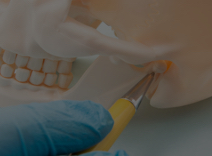Dental implants in Smithtown, NY, are advanced and innovative solutions for replacing missing teeth. They are metal posts made of biocompatible materials, usually titanium, that are surgically inserted into the jawbone beneath the gum line. They provide a strong and durable foundation for attaching prosthetic teeth, such as crowns, bridges, or dentures. This integration with the jawbone ensures stability and prevents bone loss, promoting long-term oral health.
Dental implants closely mimic natural teeth’ look, feel, and function, allowing individuals to regain their ability to chew, speak, and smile confidently. With proper care and regular dental hygiene, dental implants can last for many years, making them a reliable and permanent solution for tooth replacement.
The process of fixing dental implants near you involves several stages and typically requires the expertise of a skilled dentist or oral surgeon. Initially, a comprehensive examination and assessment of the patient’s oral health are conducted to determine their eligibility for dental implants. If suitable, the first step involves the surgical placement of the implant into the jawbone. This procedure is performed under local anesthesia, ensuring the patient’s comfort. Afterward, a healing period of several months is required to allow the implant to fuse with the surrounding bone through osseointegration.
Once the implant has sufficiently integrated, an abutment is attached to the implant, serving as a connector between the implant and the prosthetic tooth. Impressions are then taken to fabricate a custom-made crown, bridge, or denture securely attached to the abutment. The final result is a fixed and natural-looking tooth replacement that is stable, functional, and aesthetically pleasing.
The lifespan of Dental Implants
Dental implants’ lifespan can vary depending on your overall health, oral hygiene practices, and lifestyle habits. However, with proper care, dental implants have the potential to last for decades, often even a lifetime. Integrating the implant with the jawbone through osseointegration creates a stable foundation that can withstand normal chewing forces.
Regular dental check-ups, professional cleanings, and diligent oral hygiene routines are crucial to prevent peri-implantitis, which can affect the longevity of the implant.
Additionally, avoiding habits like smoking and excessive teeth grinding or clenching can help prolong dental implants’ lifespan.
How to Prolong the Life of Your Implants
Prolonging the life of dental implants involves taking proactive steps to maintain their health and function. Here are some key practices to consider:
- Adopt a thorough oral hygiene routine : Brush with a soft-bristled toothbrush and use a non-abrasive toothpaste. Floss daily to clean the areas around the implant and remove any plaque or food particles. Consider using antimicrobial mouthwash to reduce the risk of infection.
- Attend regular dental check-ups : Visit a dentist near you for professional cleanings and examinations. These appointments allow for the early detection and treatment of potential issues before they escalate into more significant problems.
- Avoid harmful habits : Refrain from smoking or using tobacco products, as they can hinder healing. Additionally, avoid excessive consumption of staining substances like coffee, tea, or red wine, as they can discolor the prosthetic tooth.
- Maintain a healthy lifestyle : Follow a balanced diet of essential nutrients to support oral health. Stay hydrated, exercise regularly, and manage stress, as these factors can also impact oral health.
- Address any concerns promptly : If you experience any discomfort or pain, or notice changes in the appearance or function of your dental implant, consult your dentist immediately. Early intervention can resolve issues before they worsen and potentially affect the long-term success of the implant.
How to Spot Warning Signs That Indicate a Problem with Your Dental Implant
Awareness of warning signs that may indicate a problem with your dental implant is crucial for maintaining its long-term success. While each case is unique, there are a few general indicators to watch out for. Pay attention to any persistent discomfort, pain, or swelling around the implant area. It could be a sign of implant complications if you notice increased sensitivity to temperature or pressure when biting down.
Changes in the appearance or color of the gums surrounding the implant, such as redness or inflammation, may also warrant attention. Bad breath or a persistent unpleasant taste in the mouth could indicate an infection. Additionally, if the implant feels loose or unstable, it is essential to seek professional advice promptly.
Conclusion
Dental implants offer a durable solution for replacing missing teeth. Proper aftercare and regular maintenance can last decades, providing patients with functional and aesthetically pleasing results. Visit Joseph B Pantaleo DDS for more information about dental implants.































